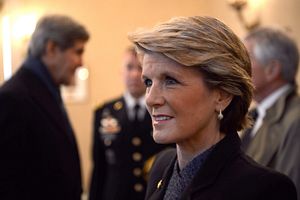Over the weekend, Australian Foreign Minister Julie Bishop made headlines when she said that the Islamic State could seek to create a caliphate in the southern Philippines. Though the concern itself is far from new, her remarks are just another sign of growing alarm in the Asia-Pacific about the terrorism threat.
Speaking after talks in Washington, D.C. with the United States and the other 67 members of the U.S.-led Global Coalition to Counter ISIL, Bishop told Sky News on Sunday that “there is concern that ISIS may well seek to declare… an Islamic caliphate in the southern Philippines.”
“That brings the threat right to our doorstep,” Bishop added.
Bishop’s warning is just the latest in a series that have come since last year about the future trajectory of the Islamic State threat in Southeast Asia. Indeed, earlier this month, Bishop had discussed this issue with Singapore, Malaysia, and the Philippines, all of which are key countries in Southeast Asia’s fight against the Islamic State (See: “Malaysia, Australia Talk Terror Amid Rising Islamic State Threat”).
As I have pointed out before, on the face of it, the southern Philippines would seem to be a good candidate for such a base of operations as Bishop indicated. The country has served as a training ground for terrorists before, including al-Qaeda’s so-called Southeast Asian offshoot Jemaah Islamiyah. Furthermore, a number of local Philippine groups have already pledged allegiance to Islamic State’s self-appointed caliph, Abu Bakr-al-Baghdadi (See: “Islamic State Eyes Asia Base in 2016 in Philippines, Indonesia”).
That said, regional states are already wary of this possibility and have been taking actions to prevent it from occurring. The Philippine military has stepped up its crackdown on local militant groups under President Rodrigo Duterte, who has repeatedly warned about the rising terrorism threat. Meanwhile, other neighboring states are working hard to try to disrupt the entry of fighters into the southern Philippines to “reduce the transit dimension of the threat also,” a Philippine official told The Diplomat earlier this month.
































